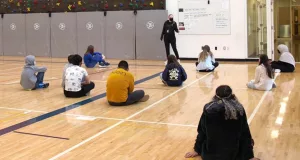Originally published Jan. 27, 2022 by Seattle Public Schools.
Robert Eagle Staff Middle School students begin their Partner Physical Education class seated in front of the gym’s white board waiting for the Question of the Day.
P.E. Teacher Amy Matsen stands in front of the class and asks, “If you could have a business, any type of business, what business would you have?”
 Some students answer with “cupcake shop,” “bakery,” and “boba tea shop.” Others react with excitement, and some sit quietly observing.
Some students answer with “cupcake shop,” “bakery,” and “boba tea shop.” Others react with excitement, and some sit quietly observing.
Although this activity may seem unrelated to P.E., it’s an intentional part of the class. The question is designed to help students build their social-emotional skills and relationships with other classmates.
The Partner P.E. program is a modified class designed to meet the needs of students receiving special education services. General education students choose to take the class alongside these students and act as partners and leaders, helping students receiving special education services gain confidence and succeed in the class.
“An adapted P.E. class is an important part of a school,” Matsen said. “All students can be successful. So, when you modify activities and accommodate students with different equipment, or break down the rules for the game, everyone can succeed.”
To build student’s fitness and motor capabilities, the class continues with warmups, which includes a consistent routine of upper and lower body movements.
“With our students with disabilities, having a routine helps with anxiety and allows practice to build skills,” Adapted Physical Education Specialist Toni Bader said. “In the beginning of the semester you probably wouldn’t have seen all of the kids [moving] together, now you seen some really good skills.”
The general education students warm up alongside students receiving special education services and act as models, showing students how to complete movements.
Next, students have a chance to practice their sports skills with a modified sports match.
“We’ve done a lot of professional development to set up for universal design, so setting up the activities with adaptations, accommodations, modifications—so every student is successful,” Bader said. “If you adapt and modify the rules a little bit, you allow everybody to participate and everybody to be successful, and it’s still fun!”
The class ends with students cooling down by walking around the gym—or the track on a nice day—giving and receiving compliments, then a debriefing session with general education students to review class activities and provide feedback, which helps with leadership experience.
The general education students explain they’ve learned a lot and enjoy the time they spend helping others and interacting with all kinds of students.
“Everyone helps each other out. We all work together,” sixth grader Naomi Weber said. “You become good friends with everyone.”
“I’ve made a lot of friends with people I wouldn’t know,” seventh grader Indigo Freeman-Burnett said.
Matsen has seen first-hand the connections students make with each other and is proud of all they learn while in the class.
“I really love watching the students interact and support each other and be really proactive in getting to know every single [person] in class no, matter who they are,” Matsen said. “Watching them be empathetic, understanding humans and super patient, and become leaders is so amazing.”
The program was introduced at SPS by Bader almost seven years ago and has expanded to six other schools, including Chief Sealth International High School, Eckstein Middle School, Jane Addams Middle School, Mercer International Middle School, Roosevelt High School, and Whitman Middle School. Denny International Middle School will begin the program in second semester this year.
Bader continues to work with additional schools and is hoping to bring the program to even more campuses in the coming years.
Make the IHT ZONE heart rate monitor part of your School’s Student Wellness Program
[contact-form-7 id=”27996″ title=”Contact Us Single Column”]


